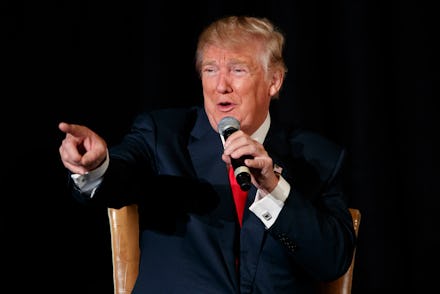Donald Trump suggests military veterans who develop PTSD are weaker than those who don't

Republican presidential nominee Donald Trump made yet another misstep Monday during a week filled with blunders and damaging revelations, suggesting that military veterans who suffer from post-traumatic stress disorder or who commit suicide are weaker than those who don't.
During a question and answer session with veterans in Herndon, Virginia, hosted by Retired American Warriors, Trump said many who return home from war can't cope with the things they saw on the battlefield.
"When people come back from war and combat and they see things that maybe what the people in this room have seen many times over, and you're strong and you can handle it, but a lot of people can't handle it," Trump said.
Trump went on to say that the issue needs to be better addressed by the military.
But his words quickly caught on in a negative way, with veterans and others criticizing the words he used which made it seem like he thought those who suffer PTSD were weaker than those who don't.
Trump has spoken often about veterans' care and veterans' suicide on the campaign trail, vowing to tackle the growing problem of PTSD and other mental illness veterans suffer in the wake of a more-than-a-decade-long war in the Middle East.
While the Department of Veterans Affairs has been blamed for lacking the necessary amount of mental health services to deal with the problem, other veterans and military families have said the negative stigma of receiving mental health services is equally problematic.
During a Sept. 28 presidential town hall hosted by CNN, a Gold Star wife whose husband committed suicide after returning home because he was too afraid to seek treatment for his PTSD asked President Barack Obama how he would tackle the issue.
Obama said he was working with military commanders to try and lower that stigma.
"The first is I have instructed the joint chiefs and up and down the chain of command that they have a responsibility to de-stigmatize mental health issues and issues of PTSD and help to explain to everybody in all of the units under their command that there's nothing weak about asking for help," Obama said.
But Trump's insinuation that those who suffer from PTSD aren't strong threatens to undermine that effort.
Monday's remarks don't mark the first time Trump has insinuated that those who experience mental illness or seek help are weak. In November 2012, he boasted that he had never seen a psychiatrist, and preferred instead to "hit 'sleazebags' back."